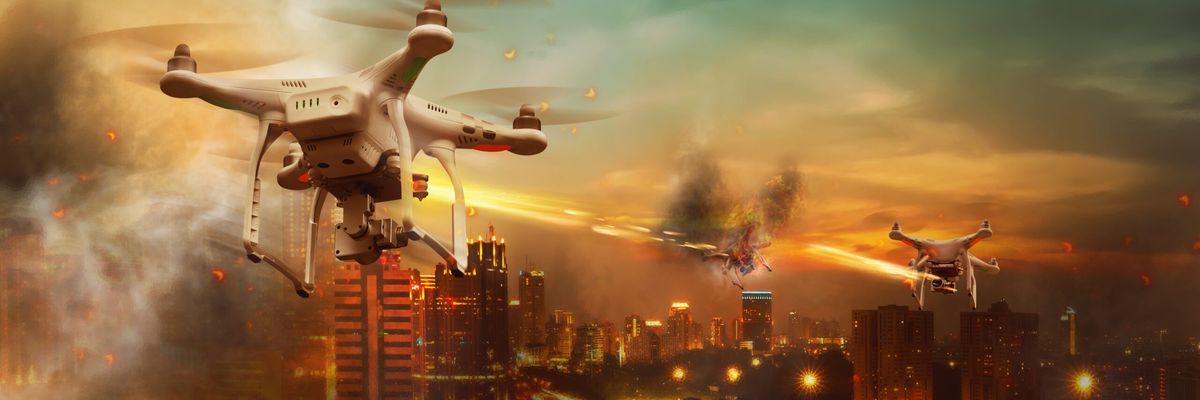What better place than a National Defense Industrial Association confab to announce a new program in which "multiple thousands" of drones will be unleashed across land, sea, and sky "to counter the PLA’s [People’s Liberation Army’s] mass with mass of our own, but ours will be harder to plan for, harder to hit and harder to beat.”
It rings a bit like science fiction but to a roomful of defense executives, Deputy Secretary of Defense Kathleen Hicks' words on Monday must have been music to their ears. A lot of dollar signs. Especially when Adm. John Aquilino, head of U.S. Indo-Pacific Command, joined in and told the NDIA "Emerging Technologies for Defense" audience that there could be as many 1,000 drones deployed in 24 hours — “Here’s a metric for me: 1,000 targets for 24 hours.”
At which point Hicks signaled that might be just the baseline. "We’ll also aim to replicate and inculcate how we will achieve that goal, so we can scale whatever’s relevant in the future again and again and again. Easier said than done? You bet. But we’re going to do it,” she said.
Welcome to the second era of the drone war, the first being during the U.S. Global War on Terror, where drones like the MQ Reaper were primarily used for surveillance and manhunting. It was billed as an "evolution" in targeted conflict in which the government promised "cleaner" war with fewer civilian deaths and American boots on the ground. Today's era is about "meshing" both surveillance and lethal action with a pronouncement of drones, all shapes and sizes, and not just the big expensive ones. This is being tested and improved everyday with tens of thousands of drones on both sides in Ukraine and now the Pentagon is promising the next level of that for its coming war with China.
"While both combatants entered the war with drones, there has been a Cambrian explosion in missions and types of drones over the past 18 months," gushed retired Australian army major general Mick Ryan in an article on Monday. "Just as the Cambrian period saw the most intense period of evolution in history, so too has the Ukraine War spawned a rapid evolution in these machines."
Ryan says the swarming of drones across the battlespace has resulted in "an extraordinary increase in the visibility of events on and beyond the battlefield." This allows for "the speed of decision and action" and "the precision of engagements on the battlefield, as well as against strategic targets." He also notes while Ukraine has been credited with advancing its drone technology more rapidly, its still losing in the ballpark of 10,000 UAVs a month.
The U.S. not only wants to replicate this (the project is literally called "Replicator") for a future war, but it welcomes the challenge of ramping up an industrial base that is already struggling to fulfill orders to send promised U.S. weapons to Ukraine for its current war.
To succeed in this, Hicks said the initiative has the full backing of the Secretary of the Defense and Defense Innovation Unit. It will require working with “non-traditional and traditional defense companies,” and that Congress “has the opportunity to be a key enabler in getting capabilities to the warfighter at speed and scale.” Read: give us more money and less red tape.
Getting Congress on board won't be difficult. First, point out the amazing opportunities of drone swarms, just like major general Ryan did in his op-ed. Next, explain, like Hicks does, that China is gaining on us. It's most important asset is "mass" she said. “More ships. More missiles. More people.” The DoD must snap into action to challenge that.
“We must ensure the PRC [People’s Republic of China] leadership wakes up every day, considers the risks of aggression, and concludes, ‘today is not the day’ – and not just today, but every day, between now and 2027, now and 2035, now and 2049, and beyond,” she said.
Then, ensure that their friends in the defense industry will be happy as most of the top five contractors have been seeding pieces of every major project in their districts for years, not to mention the $33 million in campaign contributions (in the 2022 cycle alone).
It's a win-win for everyone, at least in the military industrial complex, especially when you can talk like Adm. Aquilino, straight out of a Tom Clancy novel. Well, sort of: "Operational concepts that we are working through are going to help amplify our advantages in this theater…there’s a term, hellscape, that we use.”
I'm sure the term is being used by a lot of folks right now, aside from the uniformed high hats at the JW Marriott in Washington D.C., starting of course, with people on the ground in southern and eastern Ukraine. I guess it differs in meaning based on who is actually creating the "hellscape," and how.
















